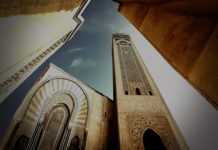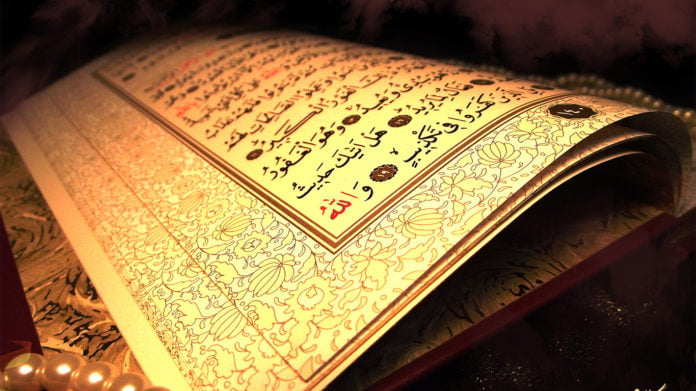| 1) By the morning brightness, 2) and by the night when it grows still.* 3) Your Lord has not forsaken you, nor does He abhor (you). 4) The Last will be better for you than the First. 5) Your Lord will soon give to you and you will be satisfied. 6) Did He not find you an orphan and give you shelter? 7) Did He not find you wandering and guide (you)? 8) Did He not find you destitute and enrich (you)? 9) Therefore, do not oppress the orphan, 10) do not berate the beggar, 11) and proclaim the favour of your Lord. |
By the morning brightness, and by the night when it grows still, Allah, Most High, has taken an oath by the prime of the morning when its light diffuses and spreads, and by the night when at its stillest and darkest. The purpose of these oaths is to stress Allah’s concern for His Messenger ﷺ: Your Lord has not forsaken you, since the time He has attended to you, nor has He ever ignored you when tending to you as you grew up, rather He nurtured and cultivated you in the best and most complete of ways, and raised your prestige stage by stage nor does He abhor, you. Since He loved you, He has never hated you. This is because when a negation is stated, intending praise thereby, it automatically presupposes the opposite of what is negated for a mere negation, by itself, is not praiseworthy.
This then is the state of the Messenger of Allah, past and present: it is the most perfect and most complete of states, it is a state in which Allah loves him and this love endures, it is a state in which Allah elevates him through the stations of perfection, it is a state in which Allah is continuously concerned with him.
As for his state in the future, The Last will be better for you than the First, meaning every state you will reach in the future will be better for you than the former state you were in. He ﷺ continuously ascended through the most sublime stations; Allah made firm his religion for him, aided him against his enemies, and made him steadfast in all circumstances till the day he passed away. When he passed away, he had arrived at state not reached by those who came before him or would come after him in terms of excellence, blessings, joy of eye and delight of heart. Moreover, after all this, ask not about his exalted state in the Hereafter, the details of the way his Lord will bless him and grace him! This is why He said, your Lord will soon give to you and you will be satisfied, this is something that cannot be expressed in words other than in this succinct way.[1 ]
Did He not find you an orphan, without father or mother, and give you shelter? His father had died while he was yet an infant and so Allah took him into His protection and caused his grandfather, ‘Abdul-Muttalib to care for him. Then when his grandfather died, Allah caused his uncle, Abu Talib to care for him. This continued until He aided him with His help and through the believers. Did He not find you wandering not knowing what the book was nor what faith was[2] and guide (you)? teaching you what you did not know and granting you the accord to perform the best of deeds and have the best mannerisms. Did He not find you destitute poor and enrich (you)? through the lands that He allowed you to conquer which then surrendered their wealth to you and their land-tax.[3] The One who removed these handicaps from you shall soon remove all such handicaps from you. Be grateful to the One who led you to the state of enrichment, who protected you, aided you and guided you! This is why He proceeds to say, Therefore do not oppress the orphan, act not unjustly towards him in your dealings with him, let not your breast be constrained towards him, do not turn him away, rather honour him and give him whatever you can give easily. Treat him as you would like your children to be treated after you have passed away. Do not berate the beggar, speak not unkind words to him in order to turn him away, rather give him whatever you can give easily, or turn him away in a kindly and gentle manner. Included in this category of people is one who asks for wealth and one who asks for knowledge. It is for this reason that the teacher is enjoined to display fine conduct to his student, to honour him and to show him affection. In doing so he will be aiding the student in fulfilling his goal and he will be honouring someone who will benefit the servants and the various lands. And proclaim praise Allah for His blessings, mention specific favours when there is a benefit in doing so, otherwise, as a general course, mention them in a general way. Mentioning them leads one to be grateful and to love the one who conferred them: hearts naturally love those who do good to them the favour of your Lord, both the worldly and religious.
Endnotes
* or when it envelops, or when it dissipates, or at its darkest [Abu Hayyan]
1. Muslim records on the authority of `Abdullah ibn `Amr ibn al-`As that,
| The Prophet ﷺ recited the saying of Allah concerning Ibrahim, But whoever follows me, he certainly is of me. And whoever disobeys me – still You are Forgiving, Merciful (14:36); and the saying of `Isa, If You punish them, they are Your servants, and if You forgive them (they are Your servants) (5:118) and then raised his hands in supplication, Allah! My nation! My nation! and he wept. Allah, Most High, said to Jibril, Go to Muhammad and even though your Lord already knows and ask him what ails him. So Jibril went to the Prophet ﷺ and asked him and he told him. Then Allah said to Jibril, Go to Muhammad and tell him that Allah says to you, We will make you well-content with regards your nation and we shall not cause you distress. |
`Ali (RA) said to the Iraqis, You think that the verse that inspires most hope is, Say: O My servants who have transgressed against their souls! Despair not of the mercy of Allah: Allah forgives all sins: He is Oft-Forgiving, Most Merciful (39:53) whereas we, the family of the Prophet, say that the verse which inspires most hope in the Book of Allah is, Your Lord will soon give you and you will be satisfied!
A hadith mentions that when this verse was revealed, the Prophet ﷺ said,
Therefore, by Allah, I will never be content if even one of my nation remains in the Fire! [Qurtubi]
2. Shura (42): 52
3. Others said: i.e. through your wife Khadijah, stating that this chapter was revealed in Mecca whereas the various conquests at the hand of the Messenger of Allah ﷺ came about when he was in Medina. [Qurtubi]
(NOTE: If you want to build a strong and powerful relationship with Allah, check out Islamia TV, where you can watch Islamic speakers from across the globe deliver inspiring and motivational courses. Learn more at www.islamia.tv.)
















































